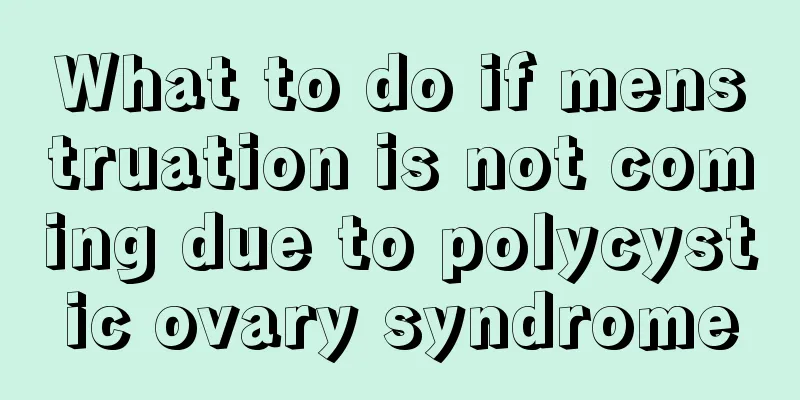What should I do if I don't have my period after IUD removal?

|
Many women choose to use an IUD as a contraceptive method, but after removing the IUD, some symptoms will appear in the body, which makes them particularly worried. For example, some female friends will not have their menstruation after removing the IUD. After all, menstruation is an important criterion for judging women's physical health. If there is no menstruation, there must be some problems with the body. So what should you do if you don’t have your period after having your IUD removed? Let’s take a look at the explanation below. Some women are very anxious when they don’t have their menstruation after having their IUD removed. What happens if you don't have your period after having your IUD removed? A senior gynecologist in Beijing said that generally speaking, there are two main reasons why you don't have your period after having your IUD removed: It's caused by neuroendocrine dysfunction, mainly due to unstable or defective function of the hypothalamus-pituitary-ovarian axis, that is, menstrual disorder. Organic diseases or drugs may cause the absence of menstruation after IUD removal, including local inflammation of the reproductive organs, tumors and developmental abnormalities, malnutrition, intracranial diseases, other endocrine dysfunctions, etc., which will affect conception. It is recommended to go to a professional gynecological examination and receive symptomatic treatment under the guidance of a doctor. In general, theoretically, removing the IUD does not affect the menstrual cycle. But after all, the intrauterine environment has changed, and there are still individual differences. Many female friends experience earlier or delayed menstruation after IUD removal. A senior gynecologist in Beijing said that irregular menstruation after IUD removal is a normal phenomenon. You can observe for another menstrual period and the condition may improve. A senior gynecologist in Beijing reminds that you should get adequate rest within 2 weeks after removing the IUD, avoid strenuous physical activities, and eat nutritious food. At the same time, you also need to pay attention to the cleanliness of the vulva. Do not take a bath or have sexual intercourse within 2 weeks. If the amount of vaginal bleeding after surgery exceeds the amount of menstruation, or the bleeding continues after half a month, or there is severe abdominal pain, etc., please return for a follow-up visit immediately to avoid menstrual disorders caused by infection after the operation. What should I do if I don’t have my period after having my IUD removed? This is a question that many female friends are very concerned about. I have given you some explanations above. I hope it can be of some help to female friends. If you also don’t have your period after having my IUD removed, don’t worry. Just go to the hospital for examination and treatment in time. The most important thing is not to ignore the existence of this disease. |
<<: Is it okay to have sex one week after an abortion?
>>: Normal female pregnancy cycle
Recommend
Note on ovulation after menstruation
We all know that each of us comes into this world...
Do uterine fibroids bleed?
Uterine fibroids are a relatively serious gynecol...
Is it normal to have menstruation once every six months?
Menstruation is also called period, and many wome...
Warning! A woman's vision dropped to 0.1 after using expired eye drops. Don't use expired eye drops anymore!
Xiao Zhao (pseudonym), a 29-year-old female offic...
What should I do if the due date is approaching and the baby has not yet entered the pelvis?
Some pregnant women should pay attention to their...
What causes delayed menstruation and pain in the left lower abdomen?
Many women will experience symptoms such as irreg...
Beauty and skin care tips, Chinese medicine whitening and freckle removal tips
Female friends all hope to have fair and moist sk...
Symptoms of insufficient blood supply to the brain in women
Insufficient blood supply to the brain is often c...
When the weather gets cold, will crayfish come out to bask in the sun? Why is the water not fertile when raising shrimp?
The weather is getting colder, and many people wh...
Several cases of abnormal leucorrhea in women
What are some cases of abnormal leucorrhea in wom...
Is frequent urination a sign of pregnancy?
There are two easiest ways for a woman to determi...
Can I eat salmon to lose weight? How can I eat salmon to lose weight?
Salmon is a deep-sea fish with a very low fat con...
Is it true that drinking sugar-free beverages will not make you fat?
1. Eating sugar brings a lot of happiness In nutr...
What kind of diet should I pay attention to if I have breast hyperplasia? It's best not to touch these foods
Dear female friends, if you have breast hyperplas...









